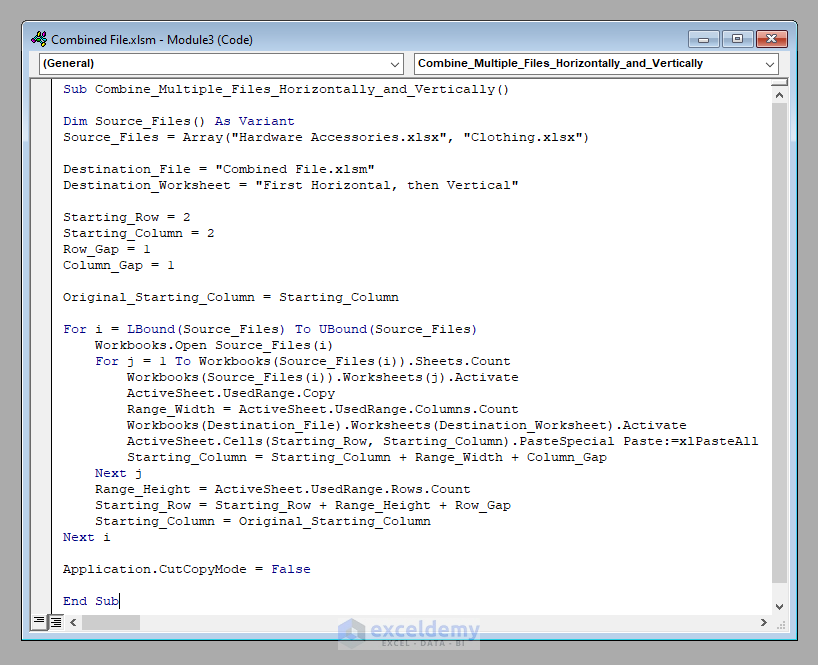Effortlessly Combine Excel Sheets into One Master Sheet

Combining multiple Excel spreadsheets into a single, cohesive master sheet can significantly streamline data management, analysis, and reporting. Whether you're dealing with financial data, inventory logs, or project timelines, merging data from multiple sources can be a game-changer. Let's delve into the various methods available for effectively consolidating your Excel sheets.
Understanding Your Options

Before we jump into the technical steps, it's essential to understand the different approaches you can take:
- Manual Copy and Paste: This is the most straightforward method, suitable for smaller datasets where manual intervention is not too time-consuming.
- Using Excel's Built-in Features: Excel provides several functions like Consolidate, Paste Links, and Power Query to combine data automatically.
- Using VBA Macros: For those comfortable with coding, VBA can automate the process, making it repeatable and reducing errors.
- Third-Party Add-ins: Tools like Ablebits, ASAP Utilities, or Exceljet offer add-ins that simplify the merging process with a few clicks.
Manual Copy and Paste

The manual method might not be the most sophisticated, but for simplicity and control, it remains a valid option:
- Open the workbook where you want to create the master sheet.
- Select and copy the data from one Excel sheet.
- Right-click where you want to paste the data in the master sheet and choose 'Paste Special' to retain formatting or paste as values only.
⚠️ Note: This method can introduce errors if not done carefully and becomes impractical with large datasets.
Using Excel's Built-in Features

Consolidate Function

This feature allows you to summarize data from multiple sheets:
- Select an empty range in the master sheet where you want the consolidated data.
- Go to the ‘Data’ tab, click ‘Consolidate’, and choose ‘Sum’, ‘Count’, or another function.
- Reference ranges from different sheets by using the dropdown menu and adding them to the ‘Reference’ list.
Paste Links

Create a dynamic link to source data:
- Copy the data from the source sheet.
- Paste it into the destination sheet using ‘Paste Special’ with ‘Paste Link’ selected.
- When changes occur in the source, the destination will automatically update.
Power Query

Power Query is Excel’s ETL (Extract, Transform, Load) tool:
- Navigate to the ‘Data’ tab, then click on ‘Get Data’ > ‘From File’ > ‘From Workbook’.
- Select the workbook containing your sheets.
- From the Navigator, choose the sheets you want to combine, and load them into Power Query Editor.
- Use ‘Append Queries’ to merge data from different tables into one.
📌 Note: Power Query is particularly useful for recurring data consolidation tasks, ensuring your master sheet is always up-to-date.
Using VBA Macros

VBA can automate the merging process for repetitive tasks:
Sub CombineSheets()
Dim ws As Worksheet
Dim masterWs As Worksheet
Set masterWs = ThisWorkbook.Sheets("Master")
masterWs.Cells.Clear
For Each ws In ThisWorkbook.Sheets
If ws.Name <> masterWs.Name Then
ws.Range("A1").CurrentRegion.Copy Destination:=masterWs.Cells(masterWs.Rows.Count, 1).End(xlUp).Offset(1, 0)
End If
Next ws
End Sub
This script will combine data from all worksheets in the active workbook into a single master sheet called 'Master'.
📝 Note: You'll need to adjust the VBA code according to your specific needs, like handling column names, row offsetting, etc.
Third-Party Add-ins

If you prefer a graphical interface over coding or manual methods, consider using:
- Ablebits: With their 'Merge Sheets' wizard, you can combine data from multiple workbooks into one sheet with ease.
- ASAP Utilities: This tool offers various commands for data management, including merging sheets.
- Exceljet: Provides a user-friendly interface for combining data with less need for complex formulas or macros.
The method you choose depends on your comfort with Excel, the complexity of your data, and how often you need to perform this task.
Ultimately, mastering the art of consolidating data in Excel not only simplifies your workflow but also empowers you to make more informed decisions based on comprehensive data. Whether you choose manual methods, Excel's own tools, VBA scripting, or third-party solutions, the key is to find what works best for your particular needs and adapt as they change. Remember, the more you practice these techniques, the more efficient and effective you'll become at managing your data in Excel.
What is the simplest way to combine Excel sheets?

+
The simplest way is often the manual copy and paste method. However, for larger datasets or recurring tasks, using Power Query or VBA macros can be more efficient.
Can Excel handle large datasets for merging?

+
Excel has limitations with very large datasets, particularly when using traditional methods. Power Query and third-party add-ins are better equipped to manage extensive data.
Is there any risk in using macros to combine Excel sheets?

+
Macros can introduce security risks if the code comes from an untrusted source. Always ensure macros are from trusted sources or are written by you.



